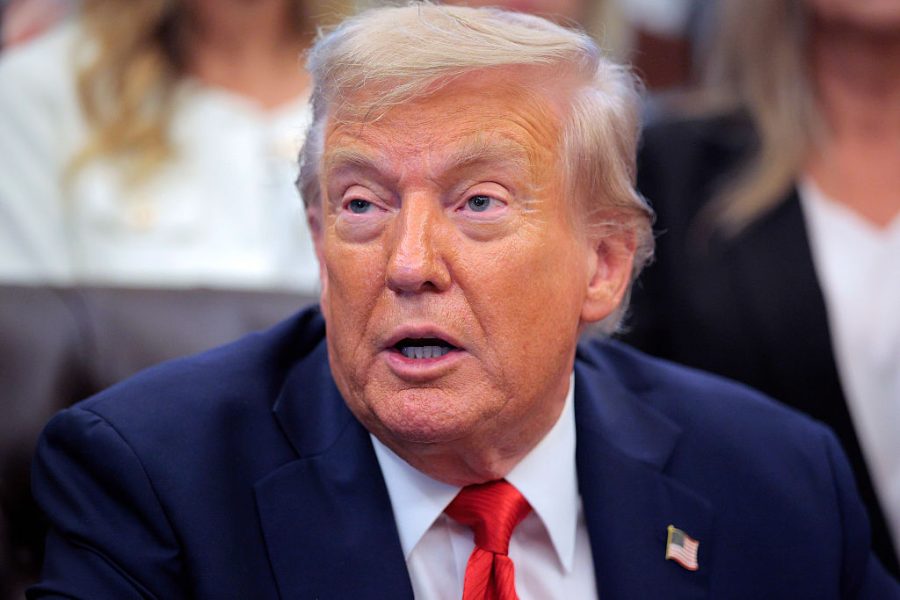The Duke of Wellington, assessing newly arrived British soldiers during the Peninsular War, is supposed to have said, ‘I don’t know what effect these men will have on the enemy, but by God, they terrify me.’ Having watched Donald Trump greet Vladimir Putin with a red carpet in Alaska a week ago, then direct his secretary of defense Pete Hegseth to sack another general and two admirals, I’m not certain that the US President even knows who the enemy in this case is.
Leading the most recent casualties was Lieutenant General Jeffrey Kruse, an experienced intelligence officer serving as director of the Defense Intelligence Agency. His mortal sin was obvious: his organisation’s initial assessment in June, which leaked to the media, was that Operation Midnight Hammer – the air strikes that same month on nuclear facilities at Fordow, Natanz and Isfahan by B-2 stealth bombers – had only set back Iran’s pursuit of an atomic bomb by a matter of months. It did not seem to have destroyed the country’s enriched uranium stockpile.
What Trump and Hegseth are doing is blood-letting, and, like all blood-letting, it will cause weakness
This was unacceptable because Trump had already presented alternative facts. He had told the American people that ‘Iran’s nuclear enrichment facilities have been completely and totally obliterated’ and that the chances of Tehran becoming a nuclear power had ‘gone for years’. Flushed with imaginary success, he also compared it to the use of the atomic bomb on Japan in 1945:
I don’t want to use an example of Hiroshima, I don’t want to use an example of Nagasaki, but that was essentially the same thing – that ended a war.
Hegseth rushed to endorse his master’s version of events. ‘You want to call it destroyed,’ he told reporters, ‘you want to call it defeated, you want to call it obliterated – choose your word. This was an historically successful attack.’
The Defense Intelligence Agency had indeed chosen its word: the critical centrifuges remained largely ‘intact’, and a source familiar with the intelligence said ‘the assessment is that the US set them back maybe a few months, tops’.
Anyone yet to understand what happens to those who try to impose reality on Donald Trump should ask Dr Erika McEntarfer, sacked as commissioner of Labor Statistics on 1 August because her bureau showed job creation had slowed over the previous three months. That was unacceptable and she paid the price, the same price General Kruse has now paid.
For good measure, Trump had Hegseth despatch two more senior officers last week: Vice-Admiral Nancy Lacore, chief of Navy Reserve, and Rear Admiral Milton Sands, commander of Naval Special Warfare Command, the 10,000-strong marine component of US Special Operations Command.
This is not an isolated incident. It is now very hard to deny that Trump is conducting a purge of the armed forces and intelligence community. To survive, officers must show absolute and unquestioning loyalty to the president’s political programme and, evidently, be prepared to tell lies to match Trump’s if the truth is inconvenient.
In seven months, 13 generals and admirals have now been removed from their posts or forced into early retirement, including the chairman of the Joint Chiefs of Staff, the chief of Naval Operations, the chief of staff of the US Air Force, the commandant of the US Coast Guard and the director of the National Security Agency. In addition, three senior civilian intelligence figures have been dismissed. The president’s principal military adviser and the heads of three of the eight uniformed services, in seven months.
Four of the officers dismissed so far have been women, including two who were the first to head their services, Admiral Linda Fagan of the Coast Guard and Admiral Lisa Franchetti of the Navy. This fits with Hegseth’s belief that the military ‘should not have women in combat roles’; his former sister-in-law alleged in an affidavit to the Senate Armed Services Committee that he did not think women should work or have the right to vote.
‘Purge’ is the wrong word, since purgation implies purification and a return to good health. What Trump and Hegseth are doing is blood-letting, and, like all blood-letting, it will cause weakness. It is bad enough that the president regards blind loyalty well beyond the bounds of reason as an essential quality; it invites only contempt that the 79-year-old’s ego is so brittle that he cannot endure contrary views to his own, especially those grounded in fact.
There is – to borrow a phrase – a hollowing-out of American military and intelligence leadership, targeting exactly those qualities most valuable: judgement, independence of mind, scepticism, curiosity, initiative and, above all, honesty. The President wants an echo chamber in uniform, with senior officers from central casting parroting his views back to him.
The result is almost inevitable. America has a president unburdened by reality and a secretary of defense with a mediocre personality and the strategic grasp of a practice-roster jock, pitifully desperate to show the machismo oozing from his pores. At some point they will concoct a reckless military operation to appeal to their sense of drama, and there will be nobody around them willing or able to speak the truth, to advise a different course of action.
Trump may be left with the wreckage of a minor humiliation, like the bloody rescue of the downed Black Hawk helicopter survivors in Mogadishu in 1993; or he could be undone by a more serious calamity like the shattering of Task Force Smith by the North Koreans outside Seoul in 1950. But two arrogant and vainglorious chancers like Trump and Hegseth, who have made it clear that adverse advice is unwelcome and regard themselves as exceptionally able, plus a $1 trillion (£742 billion) defence budget to play with, will create a disaster. It is just a matter of time.








Comments